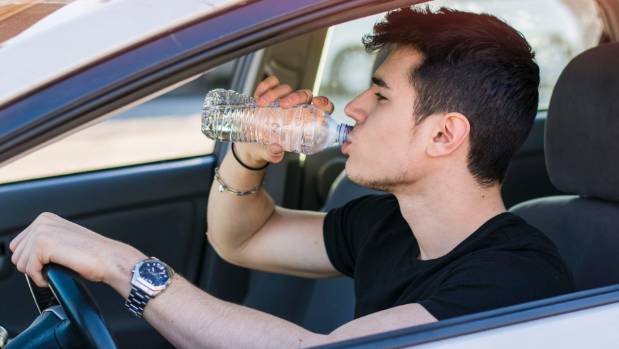It is many decades since drinking and driving were considered acceptable behaviour, and the UK’s road safety statistics are all the better for it. In the 21st century, however, the issue of drinking water has also become part of the safe motoring agenda. This may sound absurd when compared to previous eras, but in fact this everyday activity can cause motorists difficulties in more than one way. Although the habit of buying water in plastic bottles is a fairly recent phenomenon, it would seem to be a completely harmless thing to do. As some motorists are finding out, however, in the modern world, even this is a behaviour which has to be regulated.
Summer Conditions
Issues surrounding drinking water can cause drivers trouble in the summer. This is true even in a notoriously sun-free country like the UK. The fact is that enclosed driving conditions in cars, vans and lorries can act very much like a greenhouse, letting heat build up thanks to light coming through huge windscreens, and heat surfaces up. While air conditioning helps drivers and passengers while the vehicle is in motion, this gets switched off when people get out. As many dog owners have found to their cost, it doesn’t have to be particularly sunny outside for interiors to become hot and stifling.
This brings up the issue of clutter in driving compartments. Although many motorists consider this a trivial matter, it is not. In fact, if a driving test examiner considers an interior too messy and / or dirty, they can refuse to enter the vehicle, meaning an automatic fail. There are, indeed, reports that newly recruited examiners are being somewhat over-zealous in applying this rule, meaning learners have to re-apply, and losing their test fee in the process. Similarly, a vehicle will fail its MOT test if it is full of clutter; it means that, in certain circumstances, it is unroadworthy, as the driver may not be able to react quickly enough, or have a partially blocked line of sight.
Bottled Water
Of course, one thing which is very common in driving compartments is bottled water. Especially on long drives, most drivers and their passengers would expect to take at least a litre of water with them, even if it’s just to help wash down the sweets. As well as helping with sunny conditions, drinking water is a reaction to the dry atmosphere often caused by air conditioning. Although this technology is a great help in many ways, the recycled air it pumps out can feel anything but fresh.
As at least one motorist has found, however, leaving a bottle of water on a seat can have serious consequences. A scientist in the US did just that when he went to work; when he came back to his car, he found that the passenger seat – where he’d left the bottle – had a burn hole in it, directly under the water bottle, which was itself charred. The reason for this damage was that the sunlight had become focused by the water in the bottle to a concentrated point, much as it would using a magnifying glass. If failing the MOT test for clutter might seem harsh, this situation partly shows why the rule is there.
Dehydration Hazard
Meanwhile, motorists have also been warned about not drinking enough water. Motorists can now be fined £1,000 if they are found to be dehydrated while driving. Police can suspect this if the driver shows signs of dizziness and difficulty in focusing their eyes. If they then test negative for alcohol, officials will then question them regarding when was the last time they had a drink of water. Ironically, if there is no water in the vehicle itself, police can then infer that the driver may be dehydrated. According to scientists, even being mildly dehydrated can affect a motorist’s decision making as much as having drank too much alcohol.
The harmful effects of dehydration will, again, be more marked in the summer months. Experts are therefore advising motorists to drink a glass of water before setting out, even on short journeys. Of course, most people will make sure they take a bottle of water with them; which then carries the hazard of damaging their vehicle. While drinking alcohol has long been consigned to history, then, it seems that 21st century motorists now have to be careful about their water intake, and what they do with the bottles.

